Connect With Us
Blog
Items filtered by date: July 2024
Recognizing Serious Foot Problems Related to Diabetes
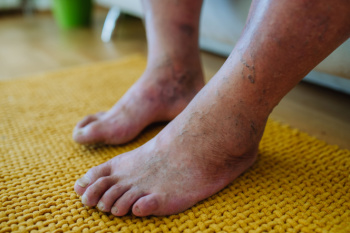
Foot problems related to diabetes can escalate quickly if not promptly addressed. Signs of serious issues include persistent numbness or tingling in the feet that could indicate nerve damage, known as neuropathy. Skin changes such as dryness, cracking, or peeling, particularly when accompanied by slow-healing sores or wounds, are concerning, as diabetes impairs circulation and wound healing. Swelling or redness surrounding a foot ulcer may indicate infection, a serious complication requiring immediate medical attention. Changes in foot shape, such as hammertoes or bunions, can also occur due to nerve damage and altered mechanics. Any sudden change in foot temperature or color warrants evaluation, as these can signal compromised blood flow. Regular foot exams by a podiatrist and diligent foot care routines are vital for managing diabetes and preventing serious foot complications. If you have foot problems related to diabetes, it is strongly suggested that you are under the care of this a podiatrist who can help you to manage this condition.
Diabetic foot care is important in preventing foot ailments such as ulcers. If you are suffering from diabetes or have any other concerns about your feet, contact one of our podiatrists from DM Foot & Ankle Associates . Our doctors can provide the care you need to keep you pain-free and on your feet.
Diabetic Foot Care
Diabetes affects millions of people every year. The condition can damage blood vessels in many parts of the body, especially the feet. Because of this, taking care of your feet is essential if you have diabetes, and having a podiatrist help monitor your foot health is highly recommended.
The Importance of Caring for Your Feet
- Routinely inspect your feet for bruises or sores.
- Wear socks that fit your feet comfortably.
- Wear comfortable shoes that provide adequate support.
Patients with diabetes should have their doctor monitor their blood levels, as blood sugar levels play such a huge role in diabetic care. Monitoring these levels on a regular basis is highly advised.
It is always best to inform your healthcare professional of any concerns you may have regarding your feet, especially for diabetic patients. Early treatment and routine foot examinations are keys to maintaining proper health, especially because severe complications can arise if proper treatment is not applied.
If you have any questions please feel free to contact our office located in Lemont, IL . We offer the newest diagnostic and treatment technologies for all your foot and ankle needs.
Get Proper Treatment for Ankle Injuries
Causes and Symptoms of Athlete’s Foot
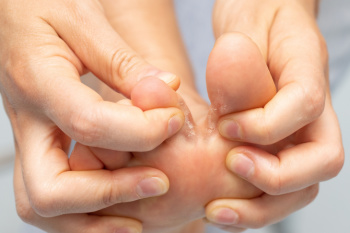 Athlete's foot, also known as tinea pedis, is a fungal infection that primarily affects the spaces between the toes. Anyone exposed to the fungus can become infected, not just athletes. Dermatophytes, the fungi responsible for this condition, thrive in warm, moist environments, making hot, sweaty feet the perfect breeding ground. Symptoms can include redness, cracking, flaking, and itching of the skin, particularly between the toes. Athlete's foot is extremely contagious, spreading through direct contact or via contaminated surfaces like gym locker rooms and communal showers at indoor pools. Risk factors can include eczema, excessive sweating, weakened immune systems, circulation problems, and wearing sturdy, non-breathable footwear. A podiatrist can diagnose athlete’s foot and recommend effective treatments as well as provide preventive measures to keep the infection from recurring. If you have developed an athlete's foot infection, it is suggested that you schedule an appointment with a podiatrist for an exam, diagnosis, and treatment options.
Athlete's foot, also known as tinea pedis, is a fungal infection that primarily affects the spaces between the toes. Anyone exposed to the fungus can become infected, not just athletes. Dermatophytes, the fungi responsible for this condition, thrive in warm, moist environments, making hot, sweaty feet the perfect breeding ground. Symptoms can include redness, cracking, flaking, and itching of the skin, particularly between the toes. Athlete's foot is extremely contagious, spreading through direct contact or via contaminated surfaces like gym locker rooms and communal showers at indoor pools. Risk factors can include eczema, excessive sweating, weakened immune systems, circulation problems, and wearing sturdy, non-breathable footwear. A podiatrist can diagnose athlete’s foot and recommend effective treatments as well as provide preventive measures to keep the infection from recurring. If you have developed an athlete's foot infection, it is suggested that you schedule an appointment with a podiatrist for an exam, diagnosis, and treatment options.
Athlete’s foot is an inconvenient condition that can be easily reduced with the proper treatment. If you have any concerns about your feet and ankles, contact one of our podiatrists from DM Foot & Ankle Associates . Our doctors will treat your foot and ankle needs.
Athlete’s Foot: The Sole Story
Athlete's foot, also known as tinea pedis, can be an extremely contagious foot infection. It is commonly contracted in public changing areas and bathrooms, dormitory style living quarters, around locker rooms and public swimming pools, or anywhere your feet often come into contact with other people.
Solutions to Combat Athlete’s Foot
- Hydrate your feet by using lotion
- Exfoliate
- Buff off nails
- Use of anti-fungal products
- Examine your feet and visit your doctor if any suspicious blisters or cuts develop
Athlete’s foot can cause many irritating symptoms such as dry and flaking skin, itching, and redness. Some more severe symptoms can include bleeding and cracked skin, intense itching and burning, and even pain when walking. In the worst cases, Athlete’s foot can cause blistering as well. Speak to your podiatrist for a better understanding of the different causes of Athlete’s foot, as well as help in determining which treatment options are best for you.
If you have any questions please feel free to contact our office located in Lemont, IL . We offer the newest diagnostic and treatment technologies for all your foot and ankle needs.
Tips for Finding Shoes That Fit Properly
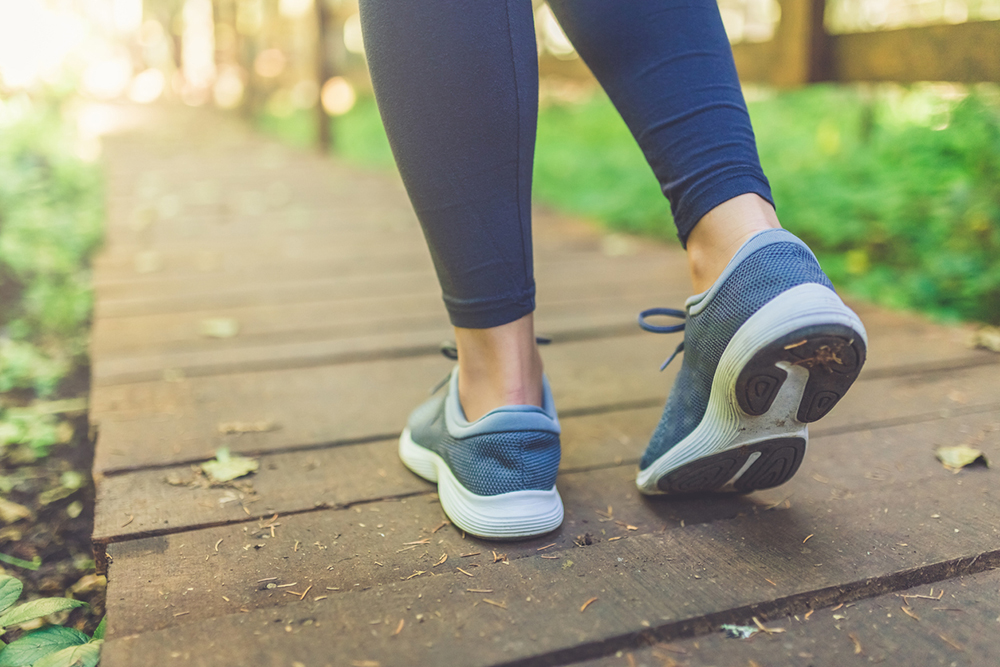
Surprisingly, about 70 percent of people wear shoes that don’t fit well, leading to discomfort and potential long-term issues affecting the feet and ankles, as well as other body parts. To ensure a proper fit, start by measuring your feet, as sizes can vary between brands and your feet change over time. Shop in the afternoon when your feet are slightly swollen, ensuring a fit that accommodates daily activity. Look for shoes with adequate support and structure, avoiding overly soft footwear that lacks stability. Check for a thumb’s width of space at the toe and consider the shape of the shoe to avoid cramped toes. Heels higher than 1.5 inches can worsen foot problems. For those on carpets or with mobility issues, lightweight polyurethane soles are a better option than heavy rubber. Breathable materials and appropriate socks are also important to prevent moisture buildup and subsequent issues, like corns or blisters. Special features can accommodate specific conditions like diabetes, bunions, or hammertoe. For personalized advice and to address any foot-related concerns, it is suggested that you make an appointment with a podiatrist.
Finding a properly-fitting shoe is important in reducing injuries and preventing foot problems. For more information about treatment, contact one of our podiatrists from DM Foot & Ankle Associates . Our doctors will treat your foot and ankle needs.
Proper Shoe Fitting
A common concern when it comes to foot health, having properly fitted shoes can help prevent injuries to the foot. Out feet affect our posture and gait, which in turn affects the biomechanics and overall bodily structure. With 33 joints, 26 bones, and over 100 ligaments, the potential for serious injury is much greater than one realizes. Although the feet cease growth in adulthood, they still change shape as they mature. Here are some factors to consider when it comes to investing in proper fitting shoes:
- Be sure the shoes fit correctly right away
- Ensure the ball of your foot fits comfortably in the widest portion of the shoes
- Even though they may look fashionable, improper fitting shoes can either create adverse conditions or exacerbate existing ones you may already have
- Walk along a carpeted surface to ensure the shoes comfortably fit during normal activity
Keeping in mind how shoes fit the biomechanics of your body, properly-fitting shoes are vitally important. Fortunately, it is not difficult to acquire footwear that fits correctly. Be sure to wear shoes that support the overall structure of your body. Do your feet a favor and invest in several pairs of well-fitted shoes today.
If you have any questions please feel free to contact our office located in Lemont, IL . We offer the newest diagnostic and treatment technologies for all your foot and ankle needs.
Common Foot Problems in Aging Feet
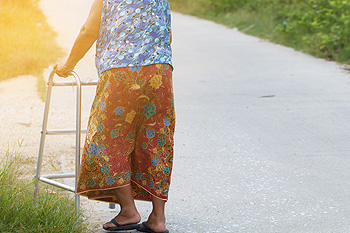 Foot care among the elderly is essential to lessen the effects of common problems that can significantly impact mobility and comfort. These can include osteoarthritis, which causes joint pain, stiffness, and swelling, making it difficult to walk. Peripheral artery disease, or PAD, leads to poor circulation, resulting in leg pain, cramping, and slow-healing sores. Neuropathy, often associated with diabetes, causes numbness, tingling, and burning sensations, increasing the risk of unnoticed injuries. Plantar fasciitis is characterized by sharp heel pain, especially in the morning or after long periods of rest. Additionally, Achilles tendonitis causes pain and stiffness along the back of the heel, often worsening with activity. These conditions highlight the importance of regular foot care, wearing appropriate footwear, and medical attention to manage symptoms and maintain foot health in older adults. If you are elderly and are experiencing any type of foot discomfort, it is suggested that you schedule an appointment with a podiatrist who can offer you appropriate treatment methods.
Foot care among the elderly is essential to lessen the effects of common problems that can significantly impact mobility and comfort. These can include osteoarthritis, which causes joint pain, stiffness, and swelling, making it difficult to walk. Peripheral artery disease, or PAD, leads to poor circulation, resulting in leg pain, cramping, and slow-healing sores. Neuropathy, often associated with diabetes, causes numbness, tingling, and burning sensations, increasing the risk of unnoticed injuries. Plantar fasciitis is characterized by sharp heel pain, especially in the morning or after long periods of rest. Additionally, Achilles tendonitis causes pain and stiffness along the back of the heel, often worsening with activity. These conditions highlight the importance of regular foot care, wearing appropriate footwear, and medical attention to manage symptoms and maintain foot health in older adults. If you are elderly and are experiencing any type of foot discomfort, it is suggested that you schedule an appointment with a podiatrist who can offer you appropriate treatment methods.
Proper foot care is something many older adults forget to consider. If you have any concerns about your feet and ankles, contact one of our podiatrists from DM Foot & Ankle Associates . Our doctors can provide the care you need to keep you pain-free and on your feet.
The Elderly and Their Feet
As we age we start to notice many changes in our body, but the elder population may not notice them right away. Medical conditions may prevent the elderly to take notice of their foot health right away. Poor vision is a lead contributor to not taking action for the elderly.
Common Conditions
- Neuropathy – can reduce feeling in the feet and can hide many life-threatening medical conditions.
- Reduced flexibility – prevents the ability of proper toenail trimming, and foot cleaning. If left untreated, it may lead to further medical issues.
- Foot sores – amongst the older population can be serious before they are discovered. Some of the problematic conditions they may face are:
- Gouging toenails affecting nearby toe
- Shoes that don’t fit properly
- Pressure sores
- Loss of circulation in legs & feet
- Edema & swelling of feet and ankles
Susceptible Infections
Diabetes and poor circulation can cause general loss of sensitivity over the years, turning a simple cut into a serious issue.
If you have any questions please feel free to contact our office located in Lemont, IL . We offer the newest diagnostic and treatment technologies for all your foot and ankle needs.
Lifestyle Factors and Medical Reasons for Cracked Heels
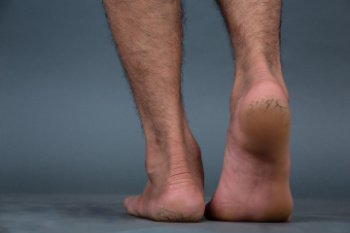
Cracked heels are caused by various lifestyle factors and medical reasons. Prolonged standing, wearing open-backed shoes, and walking barefoot on hard surfaces can contribute to the development of dry, cracked skin on the heels. Medical conditions such as diabetes, thyroid disorders, and eczema can also lead to cracked heels by causing dryness and reducing the skin's natural elasticity. To help prevent cracked heels, apply a thick, hydrating lotion to keep the feet moisturized. Wearing supportive, closed-back shoes can help reduce pressure on the heels. Additionally, using a pumice stone to gently exfoliate dead skin and avoiding walking barefoot on hard surfaces can be beneficial. If you have developed cracked heels, it is suggested that you consult a podiatrist who can effectively treat this condition, which may include prescribed medicine.
Cracked heels are unsightly and can cause further damage to your shoes and feet. If you have any concerns, contact one of our podiatrists from DM Foot & Ankle Associates . Our doctors can provide the care you need to keep you pain-free and on your feet.
Cracked Heels
Cracked heels appear unappealing and can make it harder for you walk around in sandals. Aside from looking unpleasant, cracked heels can also tear stockings, socks, and wear out your shoes. There are several methods to help restore a cracked heel and prevent further damage.
How Do You Get Them?
Dry skin is the number one culprit in creating cracked heels. Many athletes, walkers, joggers, and even swimmers suffer from cracked heels. Age and skin oil production play a role to getting cracked heels as well.
Promote Healing
Over the counter medicines can help, especially for those that need instant relief or who suffer from chronic dry feet.
Wear Socks – Wearing socks with medicated creams helps lock in moisture.
Moisturizers – Applying both day and night will help alleviate dryness which causes cracking.
Pumice Stones – These exfoliate and remove dead skin, which allows for smoother moisturizer application and better absorption into the skin.
Change in Diet
Eating healthy with a well-balanced diet will give the skin a fresh and radiant look. Your body responds to the kinds of food you ingest. Omega-3 fatty acids and zinc supplements can also revitalize skin tissue.
Most importantly, seek professional help if unsure how to proceed in treating cracked heels. A podiatrist will help you with any questions or information needed.
If you have any questions, please feel free to contact our office located in Lemont, IL . We offer the newest diagnostic and treatment technologies for all your foot care needs.
